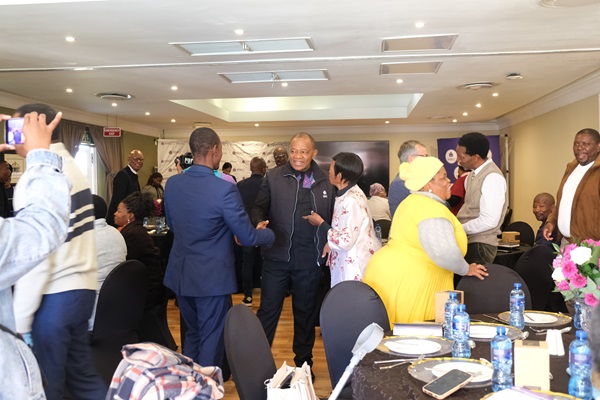By:Mafumane Tlhapi and Phenyo Mokgothu
The offline mode of Google Maps became more than a navigation tool when Pastor Piet Tlhabanyane, from Bethesda Kingdom Ministries (BKM), an NWU alumnus and a Council member, used it to explain the risks of outdated knowledge in church leadership.
“Without regular updates, even a tool as reliable as Google Maps leads you the wrong way. It’s the same with scripture. If we stop learning, we start misguiding,” said Pastor Tlhabanyane.
The NWU Faculty of Theology, in collaboration with the Alumni Office at the Mahikeng Campus, hosted the Alumni Guest Lecture on 29 May at the Protea Hotel in Mahikeng under the theme “The importance of lifelong learning for pastors and community leaders in changing times.”
Accuracy comes from constant study
Referring to 2 Timothy 2:15, Pastor Tlhabanyane explained the importance of correctly explaining the word of truth: “We must be accurate, and accuracy comes from continuous study.”
He stressed the need to simplify theological concepts. “Your message must be digestible. If no one understands you, your preaching serves no purpose.”
Addressing the challenges of a changing church environment, Pastor Tlhabanyane noted that the profile of congregants is different from a decade ago. He shared the story of a colleague who struggled to connect with a congregation that could no longer relate to English hymns.
“You must learn the language of the people, literally and culturally,” he said. “Ignoring the change doesn’t stop it.”
Churches face real-world issues
Pastor Tlhabanyane said the role of academia in ministry is not optional. “Theology doesn’t stand alone. It requires tools from other disciplines. We can’t avoid the real-world issues that walk into our churches.”
He referred to a church in India that had to adapt its message to a context filled with multiple deities. “We can’t use one-size-fits-all theology. Context matters.”
Practical ministry, he said, must meet the needs of the entire person. “We minister to minds, bodies, and spirits. And that means going beyond traditional methods.”
Lifelong learning, according to Pastor Tlhabanyane, is also tied to personal and professional development. “Learning keeps your curiosity alive. It keeps you teaching. It keeps you asking better questions.”
As ministry roles evolve, he noted the importance of adjusting accordingly. “You’re no longer just preaching. You’re managing, counselling, sometimes even troubleshooting tech.”
He pointed to AI as an emerging tool. “I used it to help write a proposal,” he said. “We must learn to work with it instead of fearing it.”
He also addressed the value of understanding different theological branches. “You can’t serve a diverse congregation with a single lens. You must know the full field.”
In his closing remarks, Pastor Tlhabanyane urged all pastors and community leaders to stay committed to learning. “You don’t need to know everything. But you do need to keep learning something.”
Guest lecture highlights shifting roles and responsibilities in modern ministry.

